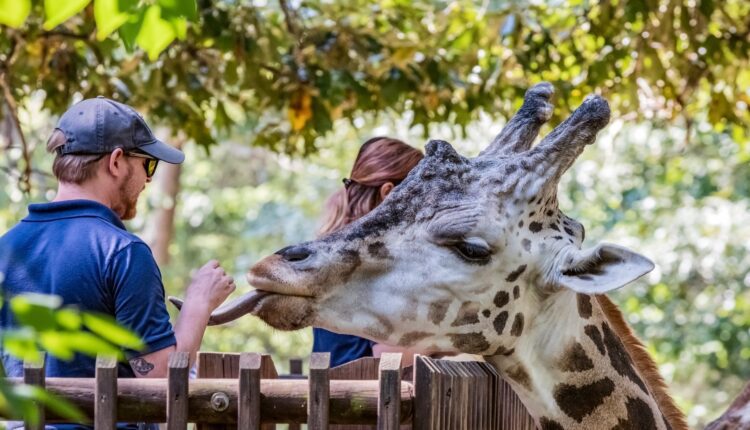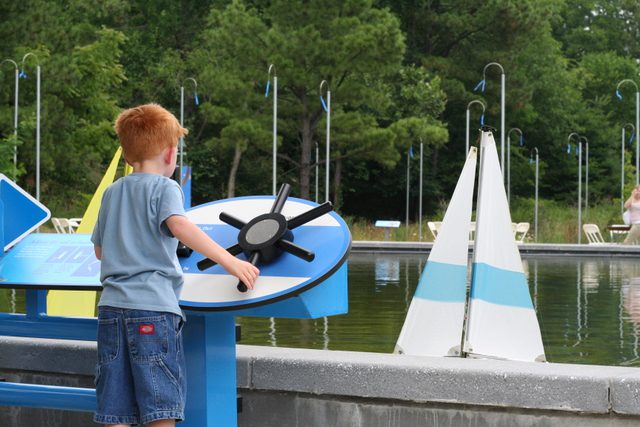
Zoo staff feed the giraffe on the Acacia Station Giraffe Deck at the North Carolina Zoo. (JNix/Shutterstock)
Our look at the six most ethical zoos in North Carolina includes aquariums, museums, and “the best zoo in the country.”
In the 2011 film “We Bought a Zoo,” Matt Damon plays widowed father Benjamin Mee, who purchases a dilapidated zoo with his family and takes on the challenge of preparing the park for its reopening to the public.
While the movie is ostensibly set in Southern California, it’s actually based on the Dartmoor Zoological Park, a 33-acre zoological garden near the village of Sparkwell in Devon, England.
But what would it take to open a zoo in America and run it in an ethical manner? Well, it’s not easy.
Back in 2018, the US Department of Agriculture filed an administrative complaint against the owner of Lazy 5 Ranch, a popular drive-through exotic animal park in Mooresville, after inspectors documented more than 50 violations of the Animal Welfare Act. Other North Carolina parks have faced similar complaints, including Troutman’s Zootastic Park in 2021.
As luck would have it, Zootastic was one of two North Carolina animal parks that went up for sale in spring 2024. But before you pull out that checkbook and try to play Matt Damon, you should know that this is serious business.
The Association of Zoos & Aquariums (AZA) is the organization that ensures zoos and other animal parks are doing everything they can to provide the best life possible for animals in their care.
In 1971, in response to the nation’s growing concern for animal care in the United States, AZA appointed a committee to establish a set of best practices to collectively improve professional operations among the zoological park and aquarium community. The first institution was accredited by AZA in 1974—at that time, it was a voluntary process.
In 1985, AZA placed the importance of quality ahead of quantity and made accreditation a mandatory requirement for AZA membership. Despite the resulting 75% drop in membership, AZA held firm in its decision, leading to a rise in animal husbandry and care among zoological parks and aquariums across the country as they began striving to reach the standards required for AZA membership and accreditation.
To earn AZA accreditation, zoos must meet rigorous standards in animal care, veterinary programs, conservation, education, safety, and other areas. In addition to a very lengthy written application, the AZA also requires an intense multiple-day on-site inspection and an in-person hearing in front of the Accreditation Commission.
AZA member institutions are required to repeat the entire accreditation process every five years to ensure that they are upholding the continuously evolving standards, incorporating the best modern zoological practices in animal welfare and management, and embracing modern AZA philosophies.
As of September 2024, there were 237 AZA-accredited institutions and 14 AZA-accredited related facilities. That includes seven such institutions in North Carolina. Below, we look at what makes each one of these destinations great.
1. North Carolina Zoo
4401 Zoo Parkway, Asheboro
From critically endangered vultures and gorillas in Africa to rare native plants and amphibians in our state, the North Carolina Zoo has been a leader in wildlife conservation for more than two decades.
With more than 512 developed acres and plans for further expansion, the NC Zoo is already a must-see destination for families, nature enthusiasts, and conservation advocates alike, but the slated grand opening of the zoo’s new Asia region in 2026 will further solidify the institution as an unforgettable multi-day experience for guests.
In 2024, during its 50th-anniversary celebration, The North Carolina Zoo claimed the top spot in a nationwide contest for “Best Zoo in the United States,” chosen by Newsweek readers from a list of nominees proposed and vetted by a panel of travel writers and tourism experts before Newsweek editors made a final voting selection.
“It is humbling to be recognized as ‘Best Zoo’ during our golden anniversary year when we are reflecting on our past and looking to the future,” wrote NC Zoo Director and CEO Patricia Simmons in a statement. “The North Carolina Zoo set out over 50 years ago to create a zoo unlike any other, and we are deeply honored by the outpouring of love and support throughout this contest period and beyond. This award, like any accolades we receive as an organization, is dedicated to our Zoo Team members, community partners, generous donors, and loyal guests who make the North Carolina Zoo an unforgettable place to work and visit.”
2. North Carolina Aquarium at Pine Knoll Shores
1 Roosevelt Blvd, Pine Knoll Shores
The state of North Carolina owns three North Carolina Aquarium branches. All are administered by the Department of Natural and Cultural Resources, and all are accredited members of the Association of Zoos and Aquariums. Additionally, the Aquarium is an AZA partner in SAFE: Saving Animals from Extinction, a program that utilizes the collective expertise within AZA-accredited zoos and aquariums and leverages their massive audiences to save species.
Of the three branches, the North Carolina Aquarium at Pine Knoll Shores is the largest, featuring a 306,000-gallon ocean habitat known as the Living Shipwreck. The habitat features a replica of the U-352 German submarine that was sunk off the coast of North Carolina in 1942, the first U-boat sunk by the US Coast Guard and one of three U-boats off the North Carolina coast accessible to sport divers.

A shark at the North Carolina Aquarium on Roanoke. (Royian/CC BY-SA 4.0)
The replica habitat at the Aquarium hosts sandbar sharks, a sand tiger shark, a nurse shark, sheepshead fish, Atlantic spadefish, tarpon, crevalle jack, a green sea turtle, and other species. And that’s just one of three replica wreck habitats at the North Carolina Aquarium at Pine Knoll Shores.
Imagination Bay features an immersive indoor play area for the littlest guests while visitors can also meet screech owls, Orinoco crocodiles, and three North American river otters: Eno, Pee Dee, and Rocky.
Elsewhere along the NC shore, there is the North Carolina Aquarium on Roanoke Island, located at 374 Airport Road in Manteo, and the North Carolina Aquarium at Fort Fisher at 900 Loggerhead Road in Kure Beach.
3. WNC Nature Center
75 Gashes Creek Road, Asheville
Asheville’s 42-acre WNC Nature Center is home to more than 60 species of animals, including river otters, black bears, red and gray wolves, and a cougar. Its mission is to connect people with the animals and plants native to the southern region of the Appalachian Mountains by inspiring appreciation, nurturing understanding, and advancing the conservation of the region’s rich biodiversity.
The institution has been AZA accredited since 1999.
“The standards for accreditation are higher than they have ever been,” said WNC Nature Center Director Chris Gentile upon its most recent accreditation in 2021. “We are proud that we continue to improve each and every year to meet these demands.”
Unfortunately, the Nature Center was forced to close due to wind and flood damage caused by Hurricane Helene and remains closed at the time of this writing. Things do appear to be looking up, however, as some of the animals that were forced to relocate to the Appalachian Wildlife Refuge have been returning to the WNC Nature Center property, and the venue has begun hosting behind-the-scenes Wild Walk tours and private events.
Follow them on Facebook for updates as they continue on their journey to recovery.
4. SEA LIFE Charlotte-Concord
8111 Concord Mills Boulevard, Concord
Opened in 2014 at the popular Concord Mills mall, the main attraction at SEA LIFE Charlotte-Concord is the ocean tunnel, billed as the only attraction of its kind in North Carolina.
Visitors immerse themselves in a tropical sea where sharks, rays, and a rescued sea turtle named Neptune swim overhead in 117,000 gallons of water. Wait out the aquarium’s largest nurse shark for the ultimate shark selfie. The 12-foot deep tunnel offers views of 40 species living amongst a colorful habitat.
Other attractions include an interactive touch pool, Stingray Bay, Doodle Reef, and a number of exhibits.
With more than 50 SEA LIFE aquariums located around the world, the North Carolina location is part of a larger international movement that aims to breed, rescue, and protect our oceans and every living creature that calls them home.
5. Greensboro Science Center
4301 Lawndale Drive, Greensboro
The Greensboro Science Center (GSC) is like three destinations rolled into one: an aquarium, museum, and zoo offer a fun-filled and educational experience for all ages. Originally opened as a county park called the Greensboro Junior Center in 1957, the center has grown so much since then, adding a zoo, planetarium, and botanical garden in 1973.
It’s not just about entertainment or even education, though the GSC offers plenty of both; it’s also about conservation. The Greensboro Science Center’s conservation mission is to preserve species and habitats through on-site programs, community awareness, field studies, and fundraising for local and global conservation efforts.

Aldabra giant tortoises at the Greensboro Science Center. (NCBioTeacher/CC BY-SA 1.0)
6. Museum of Life & Science
433 W Murray Ave., Durham
Featuring 84 acres of science and nature experiences to spark imagination, creativity, and new ways of thinking about our world, Durham’s Museum of Life & Science warrants a full day blocked out on your calendar.
Like the Greensboro Science Center, the Museum of Life & Science offers a range of experiences often separated into different facilities; visit an interactive aerospace exhibit just a short walk away from outdoor enclosures where you can find black bears, red wolves, and lemurs.

A child interacts with the Sail Pond at Durham’s Museum of Life & Science. (Rtphokie/CC BY-SA 2.5)
Other intriguing attractions include a sound garden, The Farmyard petting zoo, the Dinosaur Trail, an urban wetland, and so many more ways to interact with science.
“We believe scientific literacy and critical thinking are central to maintaining a healthy democratic society,” reads the museum’s website. “Science is both a community and a tool. When you understand how to use it, it is empowering on its own and has the potential to enrich your life.”
This article first appeared on Good Info News Wire and is republished here under a Creative Commons license.

Keeping pets safe in the NC heat: 10 tips from veterinarians
Two North Carolina veterinarians explain the impact of hot weather on pets, and what pet owners should do to keep their fur babies healthy all...

Go Batty: October is Bat Appreciation Month
While Halloween is undoubtedly the biggest jewel in October’s crown, there’s another reason to celebrate it: October is Bat Appreciation Month....

Endangered species in NC: What they are and how to help
Learn about five species you may not know are endangered in North Carolina. At any given time, hundreds of species that call the Tar Heel State home...

10 birds migrating through North Carolina this fall
Every corner of North Carolina can see migrating birds in the fall, and we’ve gathered 10 you don’t want to miss. You don’t need us to tell you that...







